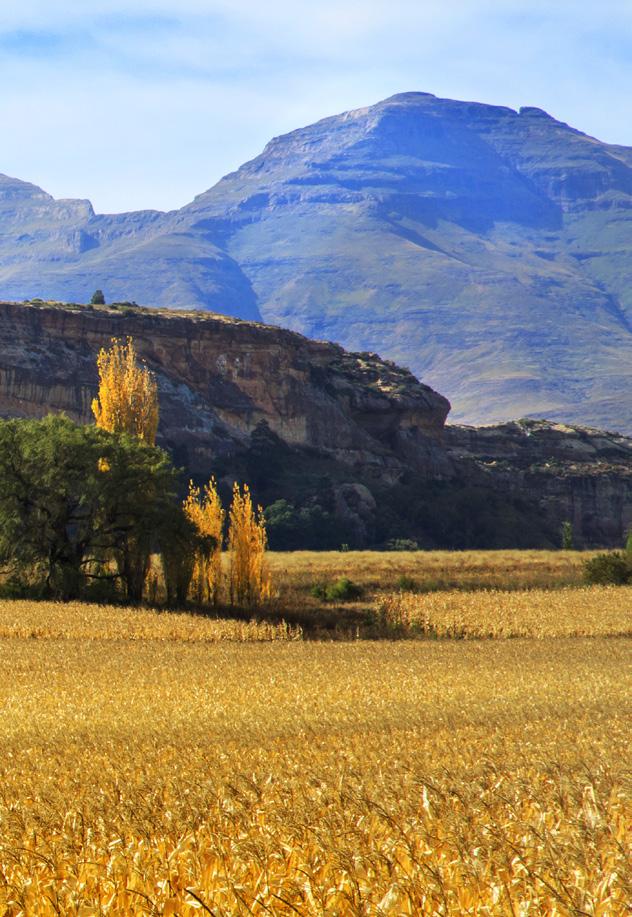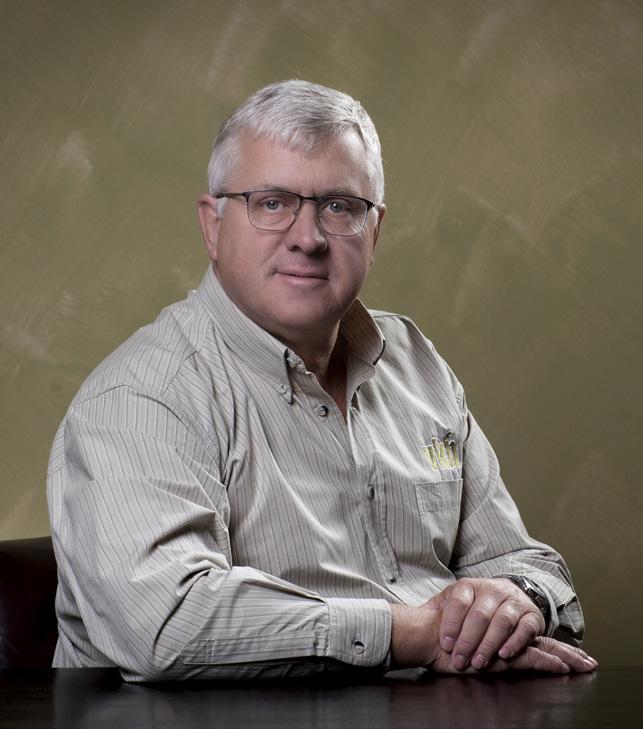
6 minute read
Agriculture
Grains and dairy farming underpin a diverse and robust sector.
The purchase of a 21% stake in BKB by VKB has given the latter company extended geographical reach and opportunities in new markets. While VKB is strongest in the Free State and Limpopo with a grain focus, BKB is well-established in the Eastern Cape, deals mainly in wool and mohair and runs many auctions.
Advertisement
VKB is already a diverse group, with the capacity to produce soybean meal and soybean cake, flour and even packaging from its plants, mills and factories. Grain Field Chickens, a large abattoir in Reitz, is one of the company’s biggest facilities in the province. The Industrial Development Corporation (IDC), which has a 23% stake in the project, aims to help develop the Free State as the poultry hub of South Africa.
VKB’s headquarters are in Reitz in the eastern part of the province and the group has nine brands in sectors such as fuel, grains, animal feed and foods. VKB has development programmes with 51 emerging commercial farmers in the province and data on 140 developing farmers.
Not many rural landing strips have to deal with 376 aeroplanes and 63 helicopters in a short space of time. But that’s what Bothaville had to do when it again hosted the country’s largest agricultural festival, NAMPO Harvest Day, in 2019. Grain SA’s big day had 775 exhibitors catering to 81 345 visitors. The annual Farmer Patent Competition is sponsored by Grain SA and Omnia, the fertiliser company.
Bothaville is located in the Lejweleputswa District Municipality on the western boundary of the Free State with North West. So far west is Bothaville that Senwes counts it
SECTOR INSIGHT
VKB has bought a stake in BKB.

as part of its North West region. The giant agricultural company, with its headquarters in the North West city of Klerksdorp, has three separate regions for the rest of the Free State. The company deals about 20% of the country’s oilseeds and grain through its 68 silos.
The Free State Department of Agriculture and Rural Development (DARD) notes that only 11% of the province’s primary agricultural production is processed within the province’s boundaries. Business Times reported in 2018 that smaller Free State dairy farmers are struggling to deal with rising costs and lower prices. With the trend towards sourcing milk in coastal areas growing, the number of dairy farms in the province has dropped to 183, from a high of 929 in 2009.
The Imbani Homsek Group is an integrated dairy-products producer with one of the biggest Ayrshire herds in the world. The farm north of Bloemfontein encompasses 6 000ha and its factories supply Woolworths. The long-life milk factory is a three-way partnership between Imbani Homsek, Woolworths and Nampak, the packaging company. The head office of Country Bird Holdings is in Bloemfontein: its brands are Supreme Chicken, Nutri Feeds and Ross (breeding). Country Bird Logistics controls 45 chilled and frozen vans.
Clover has three factories in the Free State: Bethlehem (milk powder, whey mixtures and creamers); Frankfort (butter, the largest such factory in the country, where ghee and roller dried milk powder are also made) and in Heilbron (whey, buttermilk, condensed milk and packaging).
In 2017 DARD hosted a summit on “Repositioning the Free State Province for Agricultural Value Adding and Processing Towards 2030”. Investors are being encouraged to look at baby vegetables, wholesale meat production (including poultry) and leather manufacturing.
Key to commercialising these agricultural options is access to finance and the Industrial Development Corporation has been active in the Free State in support of this goal. The official launch of the Maluti-APhofung Special Economic Zone has given another platform to boost the agri-processing and agri-logistics sectors.
A number of initiatives have taken place in terms of the land reform process. Some 6 000ha has been allocated to small-scale farmers and 500ha to farm dwellers. A land audit has been done of all land belonging to state, provincial or municipal authorities with the intention of providing land for black enterprises. The provincial government wants to see more black commercial farmers. One way of achieving this is to increase production volumes of small-scale farmers.
Five agri-parks are planned in each of the Free State’s district municipalities. The concept brings together farmers, traders and agriprocessors (such as abattoirs) in convenient sites within each district municipality. Support for rural smallholders will be available in terms of equipment hire from a central source, storage facilities, packaging of produce and getting products to market. Training will also be offered.
Provincial assets
Agriculture makes up 4% of the Free State’s gross domestic product, but the province’s efficient farming operations contributed a total of 10%
of South Africa’s agricultural output.
The Free State has 32 000km² of cultivated land and a further 87 000km² of grazing land and natural veld. A summer-rainfall region with a mean annual rainfall of 532mm, the Free State’s climate, soil types and topography vary greatly within the province, with plains in the west and mountains in the east. The western and southern areas are semi-desert, with some Karoo vegetation occurring in the south.
The province supplies significant proportions of the nation’s sorghum (53%), sunflowers (45%), potatoes (33%), groundnuts (32%), dry beans (26%), wool (24%) and almost all of its cherries (90%). Red meat and dairy are other important products. Game hunting is a growing sector, and several large Free State farms have been converted from stock to game farms. Crop production represents about two-thirds of the province’s gross agricultural income. The main crops are maize and wheat. Sunflowers, sunflower seeds, sorghum and soybeans are other major crops. The Mangaung Fresh Produce Market plays a vital role in the sector, catering as it does to householders, bulk buyers, informal traders, agents and farmers.
Glen Agricultural Training Institute is a public institution of the Department of Agriculture and Rural Development. The Institute, which caters to students in the higher and further education bands, is on the Modder River and offers threeyear diploma courses. A further training centre offers courses to farmers and farm workers. The curriculum of the higher education band consists of two electives in crop and animal production. These electives are supported by compulsory subjects in the field of engineering, economics, pasture science and extension. The curriculum of the further education band consists of short courses and learnership programmes.
ONLINE RESOURCES
Agricultural Research Council: www.arc.agri.za Bothaville: www.bothaville.info Free State Department of Agriculture and Rural Development: www.ard.fs.gov.za Grain SA: www.grainsa.co.za
Aiming for sustainability

Managing Director of VKB, Koos Janse van Rensburg.
VKB originated in a wish to create a sustainable agricultural company and a sustainable future for producers. This is still the golden thread that weaves the strategies of the company together. This is why VKB relies wholeheartedly on the support of people who have chosen the most noble profession to make a difference in our country and in the world.
The VKB Group’s primary objective is to exploit the complete value chain of agricultural production in South Africa for the benefit of shareholders. VKB wants to economically obtain their inputs, goods, services and financing on behalf of its producers by optimally utilising their collective volumes. This allows producers to focus on their farming activities.
The VKB Group also wants to add additional value to the agricultural products produced in its service area, thereby ensuring that the producer derives maximum benefit from the food value chain and obtains a share in it.







